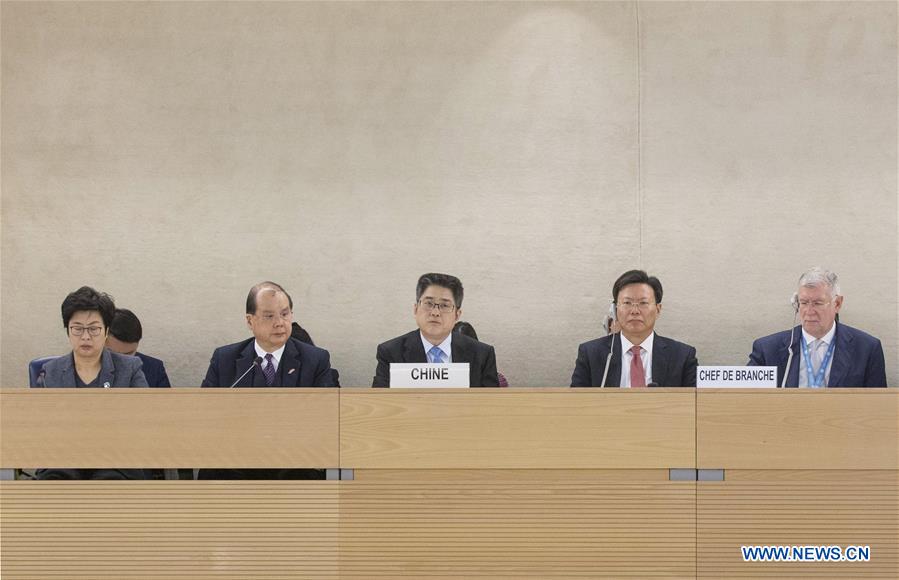China completes 3rd Universal Periodic Review at UN Human Rights Council
China on Friday completed its 3rd UN Human Rights Council Universal Periodic Review (UPR) process which its delegation head described as "smooth and successful."
China on Friday completed its 3rd UN Human Rights Council Universal Periodic Review (UPR) process which its delegation head described as "smooth and successful."
Chinese Vice Foreign Minister Le Yucheng (C) attends a session of the UN Human Rights Council in Geneva, Switzerland, March 15, 2019. [Photo/Xinhua]
"Wide recognitions" were achieved regarding China's human rights achievements, human rights development path and the country's determination to promote human rights situation, said Chinese Vice Foreign Minister Le Yucheng after the session at the council, which adopted a final report on China's third Universal Periodic Review in November 2018.
Le, also head of the Chinese delegation, recalled that he had announced last November in Geneva during the UPR that China would take 30 measures to promote further human rights development and "most of those measures have seen an early harvest."
"At today's session I further announce that China has decided to accept 284 out of 346 recommendations put forward by various parties," Le said Friday.
"China is open to accept all recommendations if they are consistent with China's realities and ... conducive to promoting and protecting human rights in China," said Le.
He refuted unfounded accusations against China made by some countries and non-governmental organizations (NGOs), saying they will end up "isolating themselves."
"China resolutely opposes the use of human rights as an excuse to interfere in China's internal affairs and undermine China's sovereignty and territorial integrity," he noted.
De-extremization measures
Asked about China's "counter-terrorism measures" in Xinjiang Uygur Autonomous Region, Le said they are not issues about ethnic or religious matters.
"They are matters concerning the maintenance of stability in Xinjiang and the maintenance of China's territorial integrity," he said.
He told reporters that Xinjiang had been affected by terrorism since the 1990s, and the government would not sit by and do nothing in the face of such threats.
The Xinjiang government has adopted a series of anti-terrorism and de-extremization measures, including the establishment of a vocational education and training program.
He stressed that terrorism activities are closely related to religious extremism, which was once rampant in Xinjiang.
"When I visited the Xinjiang vocational education and training centers, some students told me that they used to deny and reject all secular things. (They) refused to go to school, read books, watch TV, and even did not want to use the roads built by the government because they were considered as 'non-Halal'," he said.
The vocational education and training program is established to help those influenced by extremism return to normal life through education. As a preventive measure, it is another major contribution that China has made to international counter-terrorism, Le said.
"Practice has proved that the de-extremization measures adopted in Xinjiang are effective," he added.
Poverty alleviation
On human rights and development, Le said in the last 40 years China has taken 740 million people out of poverty, and last year, it took another 13.8 million poor people out of poverty.
China aims to lift all citizens out of poverty by 2020, Le added.
"China's poverty reduction achievements are the best human rights stories," he concluded.
The Chinese official told reporters that this year marks the 70th anniversary of the founding of the People's Republic of China, and China's human rights situation has achieved "historic, comprehensive and unprecedented progresses" in the past 70 years.
China has built the world's largest education system, medical system, social security system and grassroots democracy, he said, adding that according to international authoritative polls, China is one of the safest, most dynamic countries in the world with one of the highest level of satisfaction among the people.
"China has always adhered to a people-centered approach in the promotion of the people's human rights, and we will continue to set the longings of the Chinese people for a better life as our goal for the future," Le said.


